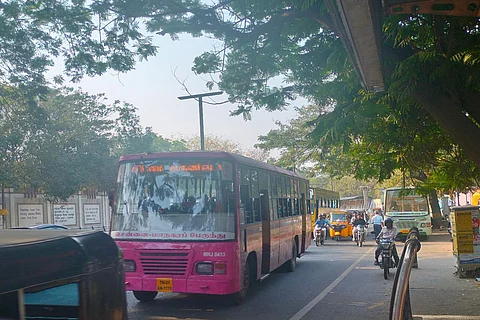

Besides helping them save on travel expenses, the Zero-Ticket Bus Travel (ZTBT) scheme for women in Tamil Nadu has enabled them to indulge in leisure activities such as visiting temples, beaches and parks besides meeting friends and relatives. That the scheme would be used for travel not related to work was one of the concerns opponents raised when the Tamil Nadu government announced the scheme but the survey shows it helped women enjoy their time out and also break restrictive patriarchal norms around travelling and engaging in leisure activities.
The recent survey by Citizen consumer and civic Action Group (CAG), a Chennai-based non-profit research organisation, revealed interesting details on how the scheme helped women. The Fair Fares: Towards Gender Inclusive Public Transport report was launched on Tuesday, February 20 noted that “women stepping out of the house in larger numbers also increases their visibility in public spaces, making it safer for women and encouraging more women to step out, creating a positive feedback loop.”
The CAG survey was carried out among 3000 women who benefit from the scheme in Tamil Nadu. The agency chose six districts, Chennai, Thiruvannamalai, Salem, Tiruvarur, Coimbatore, and Tirunelveli and interviewed 500 women each from these locations to understand how the scheme improved their daily lives in way of accessing public spaces, saving money, financial independence and finding new job opportunities. The report was launched by Dr Alby John Varghese, the Managing Director of Metropolitan Transport Corporation (MTC).
The report revealed that the scheme enabled the women to save money. Two-thirds of women stated that they were saving over Rs 400 a month. 16% said they were saving between 401 and 600. While 20% of the women could save between Rs 601 and 800. 18% said they could save around Rs 801 - 1000. The number of women saving more than Rs 1000 was just below 16%.
The report also revealed that women spent the money they saved on household necessities, food, and education. Only 18 of 3000 women said that they spent the money on their leisure and self-care. While 1191 women spent on food expenses, 879 women spent money on the education of their children, and 712 women on healthcare.
The report also noted the increase in usage of public transport by women after the scheme was introduced. According to the report, Chennai city witnessed a 99.6% increase in the usage of public transport by women. It is 72.6% for Coimbatore, 92.1% for Salem, 64.5% for Tiruvarur, 89.9% for Tirunelveli, and 99.12% for Tiruvannamalai.
Working women in formal and informal sectors, homemakers, unemployed, students, and retired people are now making more trips by public transport, the report noted. The students who participated in the survey mentioned that the scheme made travel to their educational institutions easier and less expensive and in addition to that, they use the free buses to go to their coaching centres and tuition. The women use the free buses to access workplaces (2901), do household errands and duties (1342), ferry children to school and back (1172), and for routine healthcare checkups (11).
Read: TN Budget: Stipend of Rs 1,000 for girl students in Tamil medium schools
The 2021-2022 transport policy note by Tamil Nadu Government had stated that the purpose of the scheme is to bring greater social inclusion of women. The report stated that women’s visibility in public spaces is relatively lower in India and this scheme paved the way for women to have such visibility in the public spaces. Of the 3000 women, 734 said they indulge themselves in leisure activities such as visiting temples, meeting friends and relatives, and accessing recreation facilities like malls, and beaches to have a break from their routine lives and reiterated it is crucial for everyone.
The women who participated in the survey also complained about the crowd and low number of buses. Women in Chennai and Coimbatore (387 in both cities) complained about overcrowding of buses. In Salem, 478 women complained about crowding in buses. A majority of women who took the survey in Thiruvannamalai (484), Tirunelveli (448), and Tiruvarur (462) complained about crowded buses.
Recommendations
CAG has requested the government to increase the fleet strength in Chennai and elsewhere in Tamil Nadu to meet the benchmark of 60 buses per one lakh population set by the Ministry of Housing and Urban Affairs (MoHUA). The NGO also asked the government to extend the scheme to deluxe and express buses. It also wanted the government to release the data and discuss the benefits of the scheme in public spaces as this scheme was seen by many as one for “women freeloaders’. The CAG also suggested that the government collect the gender-segregated data to understand the beneficiaries of the scheme better.
The Dravida Munnetra Kazhagam (DMK) government announced the Zero-Ticket Bus Travel (ZTBT) scheme for women in May 2021. Women commuters can travel without paying any fare in government-run buses with ordinary fares up to 30 kilometres in cities and towns in the state. In the 2024 budget, the state government extended this scheme to the women in the hilly regions of Nilgiris, Kodaikanal, and Valparai after an intersection of working unions and tribal activists urged the government to consider the plight of women in hilly areas.
Delhi was the first to give free pink paper tickets to women back in 2019. Subsequently, Punjab and Tamil Nadu also started similar programs to enable women to access public spaces. In 2023, Karnataka introduced a scheme called Shakthi to give fare-free transportation to women.